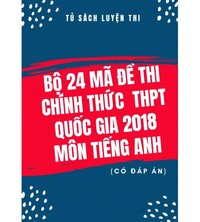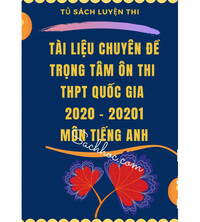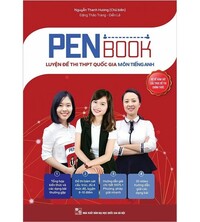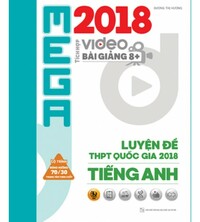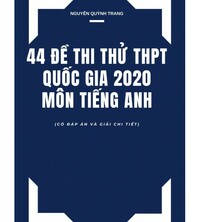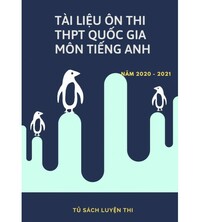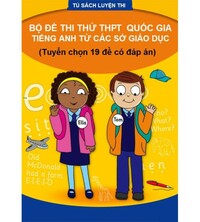Bộ đề thi thử THPT Quốc gia năm 2017 môn Tiếng Anh CÓ ĐÁP ÁN - Số 2
Cùng tham khảo Bộ đề thi thử THPT Quốc gia năm 2017 môn Tiếng Anh CÓ ĐÁP ÁN - Số 2, với tài liệu này các bạn có thể củng cố kiến thức và trau dồi kinh nghiệm hữu ích để làm bài thi cũng như một số kỳ thi khác đạt kết quả tốt nhất. Bạn có thể tải miễn phí BST này về máy để tham khảo phục vụ việc học tập đạt hiệu quả hơn.
Đề thi thử THPT Quốc gia năm 2017 môn Tiếng Anh trường THPT Chuyên Bắc Ninh có đáp án
Đề thi thử THPT Quốc gia năm 2017 môn Tiếng Anh trường THPT Tiên Du 1, Bắc Ninh có đáp án
Bộ đề thi thử THPT Quốc gia năm 2017 môn Tiếng Anh CÓ ĐÁP ÁN - Số 1
Đề thi thử THPT Quốc gia năm 2017 môn Tiếng Anh trường THPT Quảng Xương 1, Thanh Hóa (Lần 1)
Read the following passage and mark the letter A,B,C or D on your answer sheet to indicate the correct answer to each of the questions from 4 to 10.
During the seventeenth and eighteenth centuries, almost nothing was written about the contributions of women during the colonial period and the early history of the newly formed United States. Lacking the right to vote and absent from the seats of power, women were not considered an important force in history. Anne Bradstreet wrote some significant poetry in the seventeenth century, Mercy Otis Warren produced the best contemporary history of the American Revolution, and Abigail Adams penned important letters showing she exercised great political influence over her husband, John, the second President of the United States. But little or no notice was taken of these contributions. During these centuries, women remained invisible in history books.
Throughout the nineteenth century, this lack of visibility continued, despite the efforts of female authors writing about women. These writers, like most of their male counterparts, were amateur historians. Their writings were celebratory in nature, and they were uncritical in their selection and use of sources.
During the nineteenth century, however, certain feminists showed a keen sense of history by keeping records of activities in which women were engaged. National, regional, and local women's organizations compiled accounts of their doings. Personal correspondence, newspaper clippings, and souvenirs were saved and stored. These sources from the core of the two greatest collections of women's history in the United States one at the Elizabeth and Arthur Schlesinger Library at Radcliffe College, and the other the Sophia Smith Collection at Smith College. Such sources have provided valuable materials for later Generations of historians.
Despite the gathering of more information about ordinary women during the nineteenth Century, most of the writing about women conformed to the "great women" theory of History, just as much of mainstream American history concentrated on "great men. " To demonstrate that women were making significant contributions to American life, female authors singled out women leaders and
wrote biographies, or else important women produced their autobiographies. Most of these leaders were involved in public life as reformers, activists working for women's right to vote, or authors, and were not representative at all of the great of ordinary woman. The lives of ordinary people continued, generally, to be untold in the American histories being published.
4. In the last paragraph, the author mentions all of the following as possible roles of nineteenth- century "great women" EXCEPT
A. reformers B. politicians
C. activists for women's rights D. authors
5. The word "they" in the 2nd paragraph refers to
A. sources B. efforts C. authors D. counterparts
6. In the first paragraph, Bradstreet, Warren, and Adams are mentioned to show that
A. even the contributions of outstanding women were ignored
B. poetry produced by women was more readily accepted than other writing by women
C. only three women were able to get their writing published
D. a woman's status was changed by marriage
7. The word "representative" in the last paragraph is closest in meaning to _
A. satisfied B. typical C. distinctive D. supportive
8. In the 2nd paragraph, what weakness in nineteenth-century histories does the author point out?
A. The sources of the information they were based on were not necessarily accurate.
B. They were printed on poor-quality paper.
C. They left out discussion of the influence of money on politics.
D. They put too much emphasis on daily activities.
9. What use was made of the nineteenth-century women's history materials in the Schlesinger Library and the Sophia Smith Collection?
A. They provided valuable information for twentieth- century historical researchers.
B. They formed the basis of college courses in the nineteenth century.
C. They were shared among women's colleges throughout the United States.
D. They were combined and published in a multivolume encyclopedia.
10. What does the passage mainly discuss?
A. The place of American women in written histories
B. The "great women" approach to history used by American historians
C. The keen sense of history shown by American women
D. The role of literature in early American histories
Mark the letter A, B, C, or D on your answer sheet to indicate the sentence that is closest in meaning to each of the following questions.
11. I would rather you wore something more formal to work.
A. I'd prefer you wearing something more formal to work.
B. I'd prefer you to wear something more formal to work.
C. I'd prefer you should wear something more formal to work.
D. I'd prefer you wear something more formal to work.
12. Had we left any later, we would have missed the train.
A. We didn't miss the train because it left late.
B. We left too late to catch the train.
C. Because the train was late, we missed it.
D. We almost missed the train.
13. "Why can't you do your work more carefully?" said Henry's boss.
A. Henry's boss criticized him for doing his job carelessly.
B. Henry's boss asked him not to do his job with care.
C. Henry's boss suggested doing the job more carefully.
D. Henry's boss warned him to to the job carefully.
Mark the letter A, B, C, or D on your answer sheet to indicate the sentence that best combines each pair of sentences in the following questions.
16. He felt tired. However, he was determined to continue to climb up the mountain.
A. Tired as he might feel, he was determined to continue to climb up the mountain
B. He felt so tired that he was determined to continue to climb up the mountain.
C. Feeling very tired, he was determined to continue to climb up the mountain.
D. As a result of his tiredness, he was determined to continue to climb up the mountain.
17. The agreement ended six-month negotiation. It was signed yesterday.
A. The agreement which ends six-month negotiation was signed yesterday.
B. The negotiation which lasted six months was signed yesterday.
C. The agreement which was signed yesterday lasted six months.
D. The agreement which was signed yesterday ended six-month negotiation.
Mark the letter A, B, C, or D on your answer sheet to indicate the word that differs from the other three in the position ofprimary stress in eachof the followingquestions.
18. A. cosmetics B. fertility C. experience D. economics
19. A. informality B. appropriate C. situation D. entertainment
Read the following passage and mark the letter A,B,C or D on your answer sheet to indicate the correct answer to each of the questions from 20 to 27
It is commonly believed that school is where people go to get an education. Nevertheless, it has been said that today children interrupt their education to go to school. The difference between schooling and education implied by this remark is important.
Education is much more open-ended and all-inclusive than schooling. Education knows no limits. It can take place anywhere, whether in the shower or on the job, whether in the kitchen or on a tractor. It includes both the formal learning that takes place in school and the whole universe of informal learning. The agent (doer) of education can vary from respected grandparents to the people arguing about politics on the radio, from a child to a famous scientist. Whereas schooling has a certain predictability, education quite often produces surprises. A chance conversation with a stranger may lead a person to discover how little is known of other religions. People receive education from infancy on. Education, then, is a very broad, inclusive term; it is a lifelong process, a process that starts long before the start of school, and one that should be a necessary part of one's entire life.
Schooling, on the other hand, is a specific, formalized process, whose general pattern varies little from one setting to the next. Throughout a country, children arrive at school at about the same time, take the assigned seats, are taught by an adult, use similar textbooks, do homework, take exams, and so on. The pieces of reality that are to be learned, whether they are the alphabet or an understanding
of the workings of governments, have been limited by the subjects being taught. For example, high school students know that they are not likely to find out in their classes the truth about political problems in their society or what the newest filmmakers are experimenting with. There are clear and undoubted conditions surrounding the formalized process of schooling.
20. In the passage, the expression "children interrupt their education to go to school" mostly implies that .
A. schooling prevents people discovering things
B. schooling takes place everywhere
C. all of life is an education
D. education is totally ruined by schooling
21. What does the writer mean by saying "education quite often produces surprises"?
A. Educators often produce surprises.
B. Informal learning often brings about unexpected results.
C. Success of informal learning is predictable.
D. It's surprising that we know little about other religions.
22. Which of the following would the writer support?
A. Without formal education, people won't be able to read and write.
B. Going to school is only part of how people become educated.
C. Schooling is of no use because students do similar things every day.
D. Our education system needs to be changed as soon as possible.
23. According to the passage, the doers of education are .
A. only respected grandparents B. mostly famous scientists
C. mainly politicians D. almost all people
24. Which of the following is TRUE according to the passage?
A. Education and schooling are quite different experience.
B. The more years students go to school, the better their education is.
C. Students benefit from schools, which require long hours and homework.
D. The best schools teach a variety of subjects.
25. The word "they" in the last paragraph refers to .
A. workings of governments B. newest filmmakers
C. political problems D. high school students
26. The word "all-inclusive" in the passage mostly means .
A. including everything or everyone B. going in many directions
C. involving many school subjects D. allowing no exceptions
27. This passage is mainly aimed at .
A. telling the difference between the meanings of two related words "schooling" and "education"
B. telling a story about excellent teachers
C. listing and discussing several educational problems
D. giving examples of different schools
Read the following passage and mark the letter A, B, C, or D on your answer sheet to indicate the correct word orphrasethat best fits eachof the numbered blanks from 30 to 34.
HOW TO AVOID MISCOMMUNICATION IN THE WORKPLACE
As a small-business owner, you can avoid many problems simply by improving communication in your office. By clarifying everyone's expectations and roles, you'll help to (30) greater trust and increased productivity among employees. Here are a few tips for doing so.
Practice active listening. The art of active listening includes (31) close attention to what another person is saying, then paraphrasing what you've heard and repeating it back. Concentrate (32) the conversation at hand and avoid unwanted interruptions (cell phone calls, others walking into your office, etc. ). Take note of how your own experience and values may color your perception.
Pay attention to non-verbal cues. We don't communicate with words alone. Every conversation comes with a host of non-verbal cues - facial expressions, body language, etc. - that may (33) contradict what we're saying. Before addressing a staff member or (34) a project conference, think carefully about your tone of voice, how you make eye contact, and what your body is "saying. " Be consistent throughout.
Be clear and to the point. Don't cloud instructions or requests with irrelevant details, such as problems with past projects or issues with long-departed personnel. State what you need and what you expect. Ask, "Does anyone have any questions?" Demonstrate that you prefer questions up-front as opposed to misinterpretation later on.
30. A. set up B. establish C. create D. build
31. A. showing B. paying C. using D. spending
32. A. for B. to C. on D. in
33. A. intentional B. unintentional C. intentionally D. unintentionally
34. A. to lead B. being led C. leading D. lead
Đề thi thử THPT Quốc gia năm 2017 môn Tiếng Anh trường THPT chuyên Khoa học tự nhiên - ĐHQG Hà Nội (Lần 1)
Mark the letter A, B, C, or D on your answer sheet to indicate the correct answer to each of the following questions.
Question 6. The atmosphere at the meeting was very ______ and everyone was on first name terms.
| A. formal | B. informal | C. formality | D. informality |
Question 7. “Mark enjoys having fun by causing trouble. He’s very ______ boy.”
| A. strong-willed | B. mischievous | C. obedient | D. well-behaved |
Question 8. Many young people nowadays are prepared to _____ getting married to pursue their professional careers.
| A. satisfy | B. sacrifice | C. prefer | D. confide |
Question 9. My boss’s plane _____ at 10:15 tomorrow morning, but I cannot pick him up.
| A. arrives | B. is arriving | C. will be arrriving | D. arrived |
Question 10. Jack asked Jil ______ interested in any kinds of sports.
| A. if she were | B. if were she | C. if was she | D. if she was |
Question 11. Whenever problems ______, we discuss frankly and find solutions quickly.
| A. make up | B. come up | C. put up | D. turn up |
Question 12. Children should be taught that they have to _____ everything after they use it.
| A. put away | B. pick off | C. collect up | D. catch on |
Question 13. Vietnamese parents normally do not let their children make a decision ______ their own future career.
| A. in | B. of | C. on | D. for |
Question 14. The police have just found the man and his car ______ were swept away during the heavy storm last week.
| A. that | B. which | C. whose | D. when |
Question 15. ______, the more terrible the terrorism will become.
| A. The more weapons are powerful | C. The more powerful weapons are |
| B. The weapons more powerful are | D. Weapons are the more powerful |
Question 16. We are concerned with the problem of energy resources _____ we must also think of our environment.
| A. despite | B. though | C. however | D. but |
Question 17. When finding a new house, parents should ______ all the conditions for their children’s education and entertainment.
| A. take into account | B. make calculations of | C. get a measure of | D. put into effect |
Mark the letter A, B, C, or D on your answer sheet to indicate the most suitable response to complete each of the following exchanges.
Question 18. Two friends Diana and Anne are talking about their upcoming exams.
- Diana: "Our midterm exams will start next Tuesday, are you ready?"
- Anne: "______"
| A. I’m half ready. | B. God save you. | C. Thank you so much. | D. Don’t mention it! |
Question 19. Mary is talking to her professor in his office.
- Mary: “Can you tell me how to find material for my science report, professor?”
- Professor: “______”
| A. I like it that you understand. | B. Try your best, Mary. |
| C. You can borrow books from the library. | D. You mean the podcasts from other students? |
Mark the letter A, B, C, or D on your answer sheet to indicate the word that differs from the other three in the position of primary stress in each of the following questions.
| Question 20. | A. maximum | B. vacancy | C. terrorist | D. investment |
| Question 21. | A. vertical | B. contractual | C. domestic | D. outstanding |
Mark the letter A, B, C, or D on your answer sheet to indicate the word(s) OPPOSITE in meaning to the underlined word(s) in each of the following questions.
Question 22. Language teaching in the United States is based on the idea that the goal of language acquisition is communicative competence.
| A. not good at socializing | C. unable to understand |
| B. excellent in orating in front of others | D. incapable of working with words |
Question 23. This new washing machine is not a patch on our old one. These clothes are still dirty.
| A. to be expensive | B. to be strage | C. to be broken | D. to be better |
Mark the letter A, B, C, or D on your answer sheet to indicate the word(s) CLOSEST in meaning to the underlined word(s) in each of the following questions.
Question 24. Today, American English is particularly influential, due to the USA's dominance of cinema, television, popular music, trade and teachnology (including the Internet).
| A. complete mastery | B.overwhelming superiority | C. complete control | D. profound effect |
Question 25. Students' motivation for learning a language increases when they see connections between what they do in the classrooms and what they hope to do with the language in the future.
A. the reason for which someone does something
B. the actions that someone takes to deal with something
C. the eagerness that someone has to do something
D. the excitement with which one is filled when doing something.
Mark the letter A, B, C, or D on your answer sheet to indicate the sentence that is closest in meaning to each of the following questions.
Question 26. "What are you going to do with such a long list of books, Dane?" asked Sarah
A. Sarah was curious why Dane had such a long list of books.
B. Sarah asked Dane what he was going to do with such a long list of books.
C. Sarah could not understand why dane was borrowing such a long list of books.
D. Sarah warned Dane not to borrow such a long list of books.
Question 27. "Are you going to the cinema with us tonight, Susan ?" asked her friends
A. Susan's friends asked her whether she went to the cinema with them that night.
B. Susan's friends asked her if she was going to the cinema with them that night.
C. Susan's friends would like to invite her to go to the cinema with them that night.
D. Susan's friends would rather her went to the cinema with them that night.
Question 28. The Internet has enabled most people to get contact in a matter of moments.
A. Most people have been able to get in contact by the Internet in a matter of moments.
B. Most people have got in contact as enabled in a matter of moments by the Internet.
C. On the Internet, most people are able to get in contact in a matter of moments.
D. On the Internet, most people can find their contacts in a matter of moments.
Read the following passage and mark the letter A, B, C, or D on your answer sheet to indicate the correct word or phrase that best fits each of the numbered blanks from 29 to 33.
Tim Samaras is a storm chaser. His job is to find tornadoes and follow them. When he gets close to a tornado, he puts a special tool (29) ______ a turtle probe on the ground. This tool measures things like a twister's temperature. Humidity, and wind speed. With this information, Samaras can learn what causes tornadoes to develop. If meteorilogists understand this, they can warn people (30) _____ twisters sooner and save lives.
How does Samaras hunt tornadoes? It's not easy. First, he has to find one. Tornadoes are too small to see using weather satellites. So Samaras can't rely on these tools to find a twister. (31) ______, he waits for tornadoes to develop.
Once Samaras sees a tornado, the chase begins. But a tornado is hard to follow. Some tornadoes change (32) _____ several times – for example, moving east and then west and then east again. When Samaras finally gets near a tornado, her puts the turtle probe on the ground. Being this close to a twister is (33) ______. He must get away quickly.
(Source: Reading Explorer)
| Question 29. | A. called | B. known | C. made | D. meant |
| Question 30. | A. with | B. about | C. at | D. for |
| Question 31. | A. Rather | B. Still | C. Instead | D. Yet |
| Question 32. | A. progression | B. movement | C. dimension | D. direction |
| Question 33. | A. terrify | B. terrifying | C. terrified | D. terrifies |
Read the following passage and mark the letter A, B, C, or D on your answer sheet to indicate the correct answer to each of the questions from 34 to 40.
One of the highest honors for journalists, writers, and musical composers in the Pulitzer Prize. First awarded in 1917, the Pulitzer Prize has been won by Emest Hemingway, Harper Lee, John F. Kennedy, and Rodgers and Hammerstein, among others. As with many famous awards, this prize was named after its founder, Joseph Pulitzer.
Joseph Pulitzer's story, like that of many immigrants to the United States, is one of hardship, hard work, and triumph. Born in Hungary, Joseph Pulitzer moved to the United States in 1864. He wanted to be a reporter, but he started his American life by fighting in the American Civil War. After the war, Pulitzer worked for the German – language newspaper, the Westliche Post. His skills as a reporter were wonderful, and he soon became a partial owner of the paper.
In 1878, Pulitzer was able to start a newspaper of his own. Right from the first edition, the newspaper took a controversial approach to news. Pulitzer wanted to appeal to the average reader, so he produced exciting stories of scandal and intrigue. Such an approach is commonplace today, but in Putlizer's time it was new and different. The approach led to the discovery of many instances of corruption by influential people. Pulitzer's paper became very famous and is still produced today.
The success of Joseph Pulitzer's newspaper made him a very wealthy man, so he wanted to give something back to his profession. Throughout his later years, he worked to establish university programs for the teaching of journalism, and he funded numerous scholarships to assist journalism students. Finally, he wanted to leave a legacy that would encourage writers to remember the importance of quality. On his death, he gave two milllion dollars to Columbia University so they could award prizes to great writers.
Question 34. Why does the writer mention "John F. Kennedy" in line 3?
A. He was one of the inventors of the famous awards.
B. He was one of the winners of the Pulitzer Prize.
C. He was one of the people who selected the Pulitzer winners.
D. He was in one of the scandals reported on by Joseph Pulitzer.
Question 35. According to the reading passage, why did Joseph Pulitzer invent the Pulitzer Prize?
A. to encourage people to remember his name and success.
B. to encourage writers to remember the importance of quality.
C. to encourage journalism students to achieve their goals.
D. to encourage people to appreciate the work of the Pulitzer winners.
Question 36. The word "partial" in the passage is closest in meaning to ______.
A. in part only
B. brand new
C. one and only
D. very important
Question 37. According to the reading passage, who receives the Pulitzer Prize?
A. Columbia University graduates.
B. journalism students.
C. noted writers and composers.
D. most newspaper reporters.
Question 38. According to the reading nespaper, how did Joseph Pulitzer appeal to the average reader?
A. He wrote about famous writers of journalism and literature.
B. He wrote stories about the war.
C. He produced his own newspaper.
D. He produced exciting stories of scandal and intrigue.
Question 39. Which sentence about Joseph Pulitzer is true according to the reading passage?
A. He received a scholarship when he was a university student.
B. He was rich even when he was young.
C. He was a reporter during the American Civil War.
D. He immigrated to the United States from Hungary.
Question 40. Which sentence about the Pulitzer Prize is NOT true according to the reading passage?
A. Joseph Pulitzer was the first writer to win the prize in 1917.
B. Winning the prize is the highlight of a writer's career.
C. Joseph Pulitzer left money to award to the prizewinners.
D. Receiving the prize is one of the highest honors of writers.
Mark the letter A, B, C, or D to indicate the sentence that best combines each pair of sentences in the following questions.
Question 41. The teacher has done his best to help all students. However, none of them made any effort on their part.
A. The teacher has done his best to help all students, then, none of them made any effort on their part.
B. Although the teacher has done his best to help all students, none of them made any effort on their part.
C. Because the teacher has done his best to help all students, none of them made any effort on their part.
D. If the teacher has done his best to help all students, none of them made any effort on their part.
Question 42. "Finish your work. And then you can go home."
A. "You can't go home until you finish your work."
B. "You finish your work to go home as early as you can."
C. "When you go home, finish your work then."
D. "Because you have finished your work, you can go home."
Read the following passage and mark the letter A, B, C, or D on your answer sheet to indicate the correct answer to each of the questions from 43 to 50.
Clara Barton became known as "The Angel of the Battlefield" during the American Civial War. Born in Oxford, Massachusetts in 1821, Clara Barton's interest in helping soldiers on the battlefield began when she was told army stories from her father. Another event that influenced her decision to help soldiers was an accident her brother had. His injuries were cared for by Barton for 2 years. At the time, she was only 11 years old. Barton began teaching school at the age of 15. She taught for 18 years before she moved to Washington, D.C. in 1854.
The civil war broke out 6 years later. Immediately, Barton started was service by helping the soldiers with their needs. At the battle of Bull Run, Clara Barton received permission from the government to take care of the sick and hurt. Barton did this with great empathy and kindness. She acknowledged each soldier as a person. Her endurance and courage on the battlefield were admired by many. When the war ended in 1865, she used 4 years of her life to assist the government in searching for soldiers who were missing during the war.
The search for missing soldiers and years of hard work made her feeble physically. In 1869, her doctors recommended a trip to Europe for a rest. Whle she was on vacation, she became involved with the International Red Cross, an organization set up by the Geneva Convention in 1864. Clara Barton realized that the red Cross would be a big help to the United States. After she returned to the United States, she worked very hard to create an American red Cross. She talked to government leaders and let American people know about the Red Cross. In 1881, the Notional Society of the Red Cross was finally established with its headquarters in Washington, D.C. Clara Barton managed its activities for 23 years.
Barton never let her age stop her from helping people. At the age of 79, she helped flood victims in Galveston, Texas. Barton finally resigned from the Red Cross in 1904. She was 92 years old and had truly earned her titled "The Angel of the Battlefield".
Question 43. According to paragraph 1, which of the following is true of the young Clara Barton?
A. She helped her father when he was a soldier.
B. She suffered from an accident when she was 11.
C. She helped her brother who hurt in an accident.
D. She made a decision to live with her brother for 2 years.
Đáp án Đề thi thử THPT Quốc gia năm 2017
| Question | Answer | Question | Answer |
| Question 1 | A | Question 26 | B |
| Question 2 | C | Question 27 | B |
| Question 3 | C | Question 28 | A |
| Question 4 | C | Question 29 | A |
| Question 5 | D | Question 30 | B |
| Question 6 | B | Question 31 | C |
| Question 7 | B | Question 32 | D |
| Question 8 | B | Question 33 | B |
| Question 9 | A | Question 34 | B |
| Question 10 | D | Question 35 | B |
| Question 11 | B | Question 36 | A |
| Question 12 | A | Question 37 | C |
| Question 13 | C | Question 38 | D |
| Question 14 | A | Question 39 | D |
| Question 15 | C | Question 40 | A |
| Question 16 | D | Question 41 | B |
| Question 17 | A | Question 42 | A |
| Question 18 | A | Question 43 | C |
| Question 19 | C | Question 44 | D |
| Question 20 | D | Question 45 | C |
| Question 21 | A | Question 46 | B |
| Question 22 | A | Question 47 | D |
| Question 23 | D | Question 48 | B |
| Question 24 | B | Question 49 | B |
| Question 25 | A | Question 50 | A |
Đề thi thử THPT Quốc gia năm 2017 môn Tiếng Anh trường THPT Chuyên Bắc Ninh
Mark the letter A, B, C, or D to indicate the word that differs from the rest in the position of the main stress in each of the following questions.
3. A. disastrous B. humorous C. unanimous D. ambiguous
4. A. redundant B. descendant C. relevant D. consultant
Mark the letter A, B, C, or D on your answer sheet to indicate the correct answer to each of the following questions
8. There ____ a number of reasons for the falloff the Roman Empire.
A. are said to have been B. said to be
C. are said being D. was said being
9. I suggest the room ____ before Christmas.
A. be decorated B. is decorated C. were decorated D. should decorate
10. ___ wooden buildings helps to protect them from damage due to weather.
A. The paint B. Painted C. By painting D. Painting
11. Poor management brought the company to ____ of collapse.
A. the edge B. the foot C. the ring D. the brink
12. The new sports complex will accommodate an Olympic-sized swimming pool and other ____, including a fitness center and a spa, to name just a few.
A. facilities B. categories C. qualities D. supplies
13. – Would you mind helping me? - _________________.
A. No, a problem B. Sure, no problem C. No, I wouldn't D. Yes, I would
14. – Would you rather have coffee or orange juice? - ____________.
A. I like both B. I have either C. Either, please D. I'd rather to have coffee
15. When she was ____ grade 9, she wished to have someone who would stand beside her ____ thick and thin.
A. of/ in B. in/ through C. at/ between D. in/ between
16. When Martin ____ the car, he took it out for a drive.
A. had repaired B. has repaired C. repaired D. was repairing
17. He was ____ enough to admit that he knew nothing about the subject.
A. honest B. kind C. true D. smart
18. She is so ____ to her children that she has decided to quit her job to stay at home and look after them.
A. responsible B. kind C. devoted D. persistent
19. She has always shown her great self- _____ in not becoming angry.
A. controlled B. control C. controlling D. controller
20. She is intelligent ____ lazy.
A. and B. so C. but D. neither
Read the following passage and mark the letter A, B, C, or D on your answer sheet to indicate the correct answer to each of the questions.
Colors and Emotions
Colors are one of the most exciting experiences in life. I love them, and they are just as important to me as emotions are. Have you ever wondered how the two are so intimately related?
Color directly affects your emotions. Color both reflects the current state of your emotions, and is something that you can use to improve or change your emotions. The color that you choose to wear either reflects your current state of being or reflects the color or emotion that you need.
The colors that you wear affect you much more than they reflect the people around you. Of course, they also affect anyone who comes in contact with you, but you are the one saturated with the color all day! I even choose items around me based on their color. In the morning, I choose my clothes based on the color or emotion that I need for the day. So you can consciously use color to control the emotions that you are exposed to, which can help you to feel better.
Color, sound, and emotions are all vibrations. Emotions are literally energy in motion; they are meant to move and flow. This is the reason that real feelings are the fastest way to get your energy in motion. Also, flowing energy is exactly what creates healthy cells in your body. So, the fastest way to be healthy is to be open to your real feelings. Alternately, the fastest way to create disease is to inhibit your emotions.
26. What is the main idea of the passage?
A. Emotions and colors are closely related to each other.
B. Colors are one of the most exciting experiences in life.
C. Colorful clothes can change your mood.
D. Colors can help you become healthy.
27. Who is more influenced by the colors you wear?
A. You are more influenced B. The people around you are more influenced
C. both A and B D. neither A nor B
28. Which of the following can be affected by color?
A. your need for thrills B. your friend's feelings
C. your appetite D. your mood
29. According to the passage, what creates disease?
A. wearing the color black B. being open to your emotions
C. ignoring your emotions D. exposing yourself to bright colors
30. The term intimately in paragraph 1 is closest in meaning to.
A. clearly B. obviously C. closely D. simply
31. The phrase saturated with in paragraph 3 is closest meaning to
A. covered with B. bored with C. in need of D. lacking in
32. What is the purpose of the passage?
A. to give an objective account of how colors affect emotions.
B. to prove the relationship between color and emotion
C. To persuade the reader that colors can influence emotions and give a person more energy.
D. to show that colors are important for a healthy life.
Mark the letter A, B,C or D on your answer sheet to indicate the sentence that is closest in meaning to each of the following questions.
33. His irresponsible attitude is putting his career in jeopardy.
A. His so irresponsible that he has no career.
B. His irresponsible attitude is endangering his career.
C. His career is to jeopardize irresponsible attitude
D. Both A and C
34. Never have people been so well informed as they are now, thanks to TV news programs.
A. People have been so informative thanks to TV news programs.
B. Thanks to TV news programs, people are now too well informed.
C. People are better informed than they have been, thanks to TV news programs
D. TV news programs are very informative than before and people are better informed.
35. Had he known more about the internet, he would have invested in some computer companies.
A.Knowing about the internet helped him invest in some computer companies.
B. Knowing about the internet, he would have invested in some computer companies.
C. He would have invested in some computer companies without his knowledge of the internet.
D. He did not know much about the internet and he did not invest in any computer companies.
Read the following passage and mark the latter A, B, C or D on your answer sheet to indicate the word or phrase that best fits each of the numbered blanks .
Sugar tastes sweet because of thousands of receptors on the tongue which connect the substance with the brain. The taste of sweetness is universally accepted as the most pleasurable known, although it is a fructose. Abundant is the most common occurring sugar, (36)______ of which include fruit and honey. Sucrose, which supplies glucose to the body, is (37)______ from the sugar cane plant, and white sugar (pure sucrose) is used by food technologists to (38)______ sweetness in other substances. Approximately a dozen artificial sweeteners have been discovered; one of the earliest was Sorbitol from France.
Manufacturers add large amounts of sugar to foodstuffs but never more than the (39)______ required to produce the optimum pleasurable taste. Surprisingly, this amount is similar for different people and in different cultures. No one has (40)______ discovered a way to predict whether a substance will taste sweet, and it was by chance alone that all the man-made chemical sweeteners were found to be sweet.
36. A. roots B. origins C. sources D. places
37. A. drawn B. extracted C. cited D. made
38. A. smell B. detect C. taste D. measure
39. A. maximum B. excess C. extremity D. limit
40. A. just B. yet C. still D. already
Mark the letter A, B,C or D on your answer sheet to indicate the sentence that best combines each pair of sentences in the following questions.
41. On the one hand, I'd love to study Japanese. On the other hand, I really haven't got the time.
A. Nevertheless I would love to study Japanese, I really haven't got the time.
B. I really haven't got the time; as a result, I would love to study Japanese.
C. Because I haven't got the time, I would love to study Japanese.
D. I haven't got the time; therefore I would not love to study Japanese.
42. I ate the soup. After that I remembered that I had forgotten to give my little sister some of it.
A. It was not until I ate the soup did I remember that I had forgotten to give my little sister some of it.
B. As soon as I remembered that I had forgotten to give my little sister some of soup I ate it.
C. Only after eating the soup did I remember that I had forgotten to give my little sister some of it.
D. Hardly had I forgotten to give my little sister some of it when I ate the soup.
Read the following passage and mark the letter A, B, C, or D on your answer sheet to indicate the correct answer to each of the questions.
Life originated in the early seas less than a billion years after the Earth was formed. Yet another three billion years were to pass before the first plants and animals appeared on the continents. Life's transition from the sea to the land was perhaps as much of an evolutionary challenge as was the genesis of life.
What forms of life were able to make such a drastic change in lifestyle? The traditional view of the first terrestrial organisms is based on megafossils-relatively large specimens of essentially whole plants and animals. Vascular plants, related to modern seed plants and ferns, left the first comprehensive megafossil record. Because of this, it has been commonly assumed that the sequence of terrestrialization reflected the evolution of modern terrestrial ecosystems. In this view, primitive vascular plants first colonized the margins of continental waters, followed by animals that feed on the plants, and lastly by animals that preyed on the plant-eaters. Moreover, the megafossils suggest that terrestrial life appeared and diversified explosively near the boundary between the Silurian and the Devonian periods, a little more than 400 million years ago.
Recently, however, paleontologists have been taking a closer look at the sediments below this Silurian-Devonian geological boundary. It turns out that some fossils can be extracted from these sediments by putting the rocks in an acid bath. The technique has uncovered new evidence form sediments that were deposited near the shores of the ancient oceans- plant microfossils and microscopic pieces of small animals. In many instances the specimens are less than one-tenth of a millimeter in diameter. Although they were entombed in the rocks for hundreds of millions of years, many of them fossils consist of the organic remains of the organism.
These newly discovered fossils have not only revealed the existence of previously unknown organisms, but have also pushed back these dates for the invasion of land by multicellular organisms. Our views about the nature of the early plant and animal communities are now being revised. And with those revisions come new speculations about the first terrestrial life-forms.
43. In what order did the organisms first appear on earth?
A. vascular plants, plant-eating animals, carnivores
B. carnivores, plant-eaters, megafossils
C. mega fossils, prey hunters, plant-eaters
D. seed plants, ferns, megafossils
